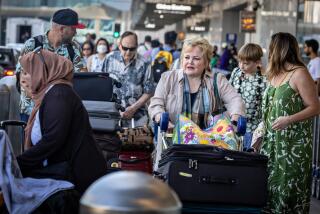TSA full-body scanners at airports pose little risk, study finds
- Share via
Full-body scanners used for security screening at the nation’s airports do not expose passengers to dangerous levels of radiation, according to a new independent analysis of the devices.
The study by the Marquette University College of Engineering concluded that radiation from so-called backscatter scanners passes beyond a passenger’s skin to reach 29 organs — including the heart and brain. But the radiation levels are considerably lower than those of otherX-ray procedures such as mammograms, the study said.
The findings will be published in the next issue of Medical Physics, an international journal of medical physics research produced by the American Assn. of Physicists in Medicine.
The study, believed to be the first independent review of the scanners, is not likely to put to rest years of heated debate over the health risk of the machines operated by the Transportation Security Administration.
The TSA has submitted the scanners for testing by the National Institute of Occupational Safety and Health, the Johns Hopkins University Applied Physics Laboratory and theU.S. Army Public Health Command. The tests concluded that the scanners posed no significant risk to passengers, but TSA critics have called for more independent studies.
The author of the Marquette study, assistant professor of biomedical engineering Taly Gilat Schmidt, did not test the actual machines. Instead, she based her conclusions on scanner radiation data released publicly by the TSA. She ran the numbers through simulation software that modeled how X-ray photons travel through a body.
The study estimated that the scanners expose a passenger to less than a third of the maximum recommended dose of 0.25 micro-sieverts , a standard established by the American National Standards Institute.
Gilat Schmidt said the results of her test suggest that the risk to passengers is negligible even for children, frequent fliers and pilots.
“Even the risk analysis experts will tell you it’s negligible,” she said.
But Sen. Susan Collins (R-Maine), ranking member of the Senate Homeland Security and Governmental Affairs Committee, questioned the Marquette study because it was based on data provided by the TSA.
“We do not truly know the risk of this radiation exposure over multiple screenings, for frequent fliers, those in vulnerable groups, or TSA’s own employees operating the machines,” she said in a statement.
Demand for hotel rooms is surging, study says
A few years ago, most hotel operators were wringing their hands over plummeting room demand in the face of the worst recession since the Great Depression.
Now the nation’s hotel operators are enjoying record demand for hotel rooms, according to a new study by STR Global, a hotel research firm in Nashville.
“Forget location, the name of the game is demand, demand, demand — and the U.S. hotel industry experienced plenty of it during 2011,” the study said.
The nation’s hotels sold more than 1 billion room nights in 2011, surpassing the previous record set in 2007 by nearly 20 million room nights, according to the study.
The average hotel rate last year was $101.71, still below the pre-recession peak of $107.38 reached in 2008, according to the study.
But the revenue collected per available room jumped to $61 in 2011, up 8.2% compared with the previous year. It was the biggest increase since 2005, when per-room revenue rose 8.6%.
After drop this year, car rental rates could rise again
Daily car rental rates for the first three months of the year were down nearly 5% compared with the same period last year.
The average daily car rental rate dropped to $40.92 this year from $42.89 a year earlier, according to a study by Travel Leaders Corporate, a travel management company in Florida.
But the price break might be temporary.
Auto rental companies started the year with a larger number of cars in their fleets than usual, said Robert M. Barton, president of the American Car Rental Assn. He said that as cars are sold off by the companies, the fleets will return to more normal levels this summer. As the supply gets more limited, prices could climb.
“We encourage customers to book early to make sure the car they need is available for their summer vacation,” Barton said.
More to Read
Sign up for The Wild
We’ll help you find the best places to hike, bike and run, as well as the perfect silent spots for meditation and yoga.
You may occasionally receive promotional content from the Los Angeles Times.






